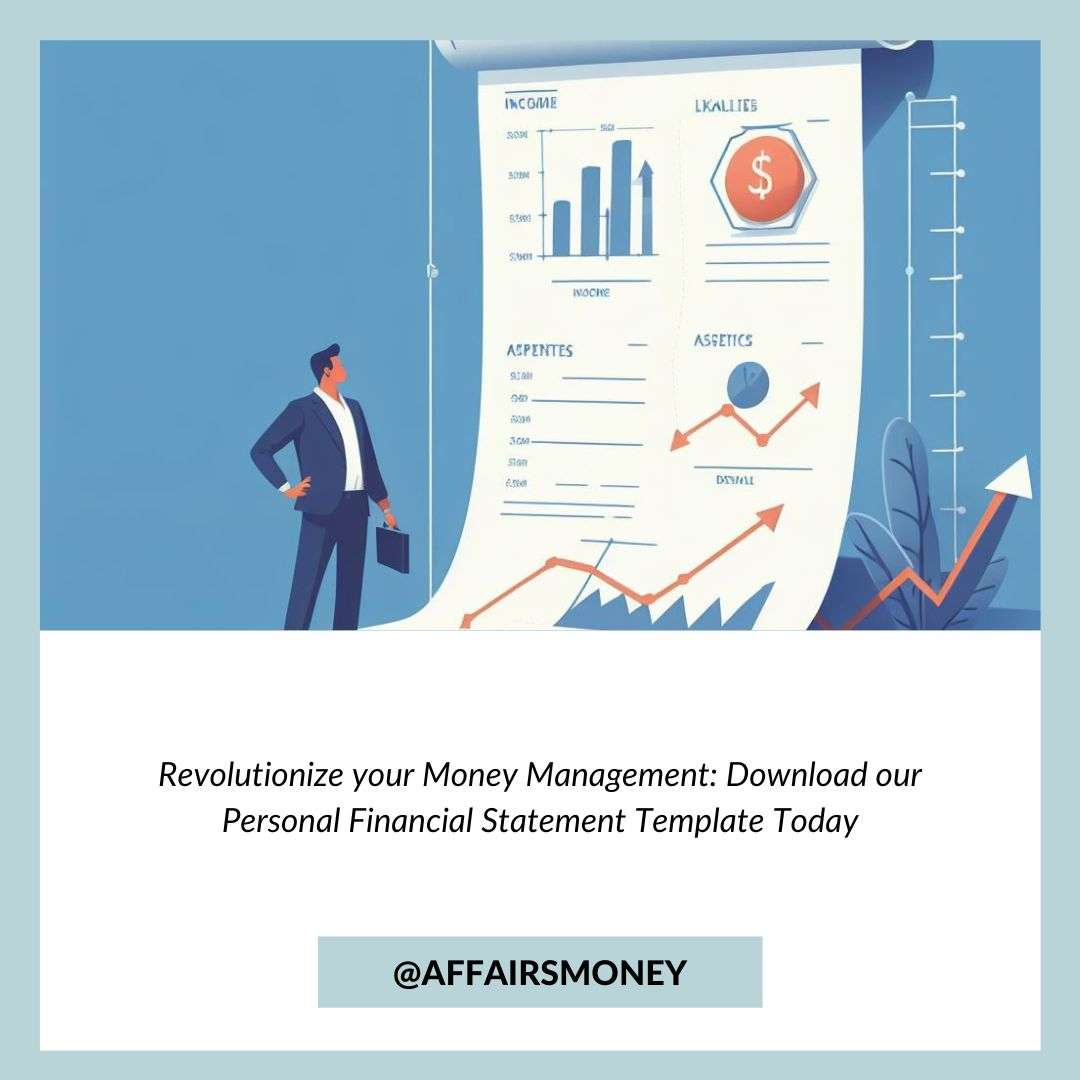Your Path to Financial Wellness Starts with a Personal Financial Statement – Discover the power of tracking your finances and securing your financial future
In a world where financial literacy is key to securing a stable future, managing your money effectively has never been more critical. At Affairs Money, we understand the significance of proper money management, and we’re excited to introduce a game-changing tool that will revolutionize the way you approach your finances. Introducing our Personal Financial Statement Template – a powerful resource designed to empower you on your financial journey.
The Importance of Money Management

Financial stability and success are often the results of well-informed decisions, prudent planning, and disciplined execution. Without a clear understanding of your financial standing, it’s easy to lose track of your spending, savings, and investments. Many individuals find themselves trapped in cycles of debt and uncertainty due to a lack of proper money management skills.
What is a Personal Financial Statement?

A Personal Financial Statement is a comprehensive document that provides an overview of your financial health. It includes detailed information about your income, expenses, assets, liabilities, and net worth. Creating and regularly updating this statement allows you to gain a holistic view of your financial situation. It acts as a roadmap, helping you make informed decisions and set achievable goals.
A Personal Financial Statement is a comprehensive document that provides a detailed overview of an individual’s financial position. It offers a snapshot of their financial health by presenting a summary of their income, expenses, assets, liabilities, and net worth. This statement is a valuable tool that allows individuals to assess their financial situation, set goals, make informed decisions, and plan for their future.
Key Components of a Personal Financial Statement:
Income: This section outlines all sources of income, including salaries, wages, bonuses, rental income, investments, and any other money coming into the individual’s finances.
Expenses: In this section, an individual lists their monthly or annual expenses, which can include housing costs, utilities, transportation, groceries, entertainment, insurance premiums, and loan payments.
Assets: Assets encompass everything an individual owns that holds value. This could involve savings accounts, investments (stocks, bonds, mutual funds), real estate, vehicles, jewelry, and other valuable possessions.
Liabilities: Liabilities represent an individual’s financial obligations, including credit card debt, mortgages, student loans, car loans, and other outstanding debts.
Net Worth: Calculated by subtracting total liabilities from total assets, net worth provides a numerical representation of an individual’s financial standing. A positive net worth indicates that assets exceed liabilities, suggesting a healthier financial position.
Importance of a Personal Financial Statement:

A Personal Financial Statement serves several crucial purposes:
Financial Assessment: It offers a comprehensive view of one’s financial situation, allowing individuals to understand where their money is coming from, how it’s being spent, and where they stand financially.
Goal Setting: By analyzing their financial statement, individuals can set achievable short-term and long-term financial goals, such as saving for a down payment on a house, creating an emergency fund, or planning for retirement.
Budgeting and Planning: With a clear understanding of their income and expenses, individuals can create a realistic budget that helps them manage their spending and work toward their financial goals.
Decision Making: A well-maintained financial statement aids in making informed decisions about investments, major purchases, debt management, and other financial matters.
Tracking Progress: Regularly updating the statement enables individuals to track their financial progress over time. Positive changes in net worth can be motivating and validate effective financial strategies.
Financial Transparency: In situations like loan applications or investment discussions, having an accurate financial statement provides transparency and helps build trust with lenders, advisors, and partners.
Overall, a Personal Financial Statement is a foundational tool that empowers individuals to take control of their finances, make sound decisions, and work toward a more secure and prosperous financial future.
How Can Our Personal Financial Statement Template Help?

Our Personal Financial Statement Template is a user-friendly tool meticulously crafted to simplify the process of assessing and improving your financial health. Here’s how it can benefit you:
1. Clarity and Insight
The template provides a structured framework to gather and organize your financial data. With categories for income sources, expenses, debts, and assets, you’ll have a clear snapshot of where your money comes from and where it goes.
2. Goal Setting and Planning
By having a precise understanding of your financial position, you can set realistic and achievable financial goals. Whether you’re aiming to save for a dream vacation, buy a home, or build an emergency fund, our template can assist in charting the path to your objectives.
3. Identifying Areas for Improvement
A crucial aspect of effective money management is recognizing areas that need improvement. Our template’s breakdown of expenses and debts allows you to pinpoint areas where you can cut back and allocate funds more wisely.
4. Tracking Progress
Regularly updating your Personal Financial Statement lets you track your progress over time. Witnessing improvements in your net worth and overall financial health can be incredibly motivating and encourages responsible financial decisions.
How to Get Started
Getting started with our Personal Financial Statement Template is incredibly simple:
Download the Template: Visit our website and download the template in a format that suits you – whether it’s a spreadsheet or a printable document.
Gather Your Information: Collect all necessary financial information, including your income sources, monthly expenses, outstanding debts, and current assets.
Fill in the Template: Using the categories provided, input your financial data into the template. Take your time to ensure accuracy.
Analyze and Plan: Once your data is in place, take a moment to analyze your financial position. Set short-term and long-term goals based on your insights.
Regular Updates: Commit to updating your Personal Financial Statement regularly – whether it’s monthly, quarterly, or annually. This practice will help you stay on top of your financial game.
Conclusion
Don’t let the complexities of financial management overwhelm you. Our Personal Financial Statement Template is a powerful ally that will help you take charge of your finances, plan for the future, and make informed decisions. The road to financial success begins with a single step – and that step is downloading our template today.
Transform your relationship with money, embrace sound financial practices, and unlock a more secure and prosperous future. The journey to financial empowerment starts now. Q1: What is a Personal Financial Statement?
FAQ
Q1: What is a Personal Financial Statement?
A: A Personal Financial Statement is a comprehensive document that outlines your financial health by detailing your income, expenses, assets, liabilities, and net worth. It provides a snapshot of your financial situation and helps you make informed decisions.
Q2: Why do I need a Personal Financial Statement?
A: Having a Personal Financial Statement helps you understand where your money is coming from, where it’s going, and how your assets and debts contribute to your overall financial picture. It’s a crucial tool for setting goals, budgeting, and planning for the future.
Q3: How do I create a Personal Financial Statement?
A: To create a Personal Financial Statement, gather information about your income sources, expenses, assets, and liabilities. Then, organize this data into categories and use a template or spreadsheet to calculate your net worth by subtracting liabilities from assets.
Q4: What information should I include in the Income section?
A: Include all sources of income, such as your salary, wages, bonuses, rental income, investment returns, and any other money you receive regularly.
Q5: What expenses should I list in the Expenses section?
A: List all your regular monthly or annual expenses, including housing costs, utilities, transportation, groceries, entertainment, insurance premiums, loan payments, and other bills.
Q6: How do I determine my net worth?
A: Calculate your net worth by subtracting your total liabilities (debts) from your total assets (valuables you own). A positive net worth means your assets exceed your debts.
Q7: Can a Personal Financial Statement help me set financial goals?
A: Absolutely! Your statement gives you a clear understanding of your financial standing, enabling you to set realistic short-term and long-term goals like saving for a vacation, buying a home, or building an emergency fund.
Q8: Is my Personal Financial Statement confidential?
A: Yes, your Personal Financial Statement contains sensitive financial information. It’s meant for your personal use, but you might need to share it with financial advisors, lenders, or investment professionals when seeking advice or making major financial decisions.
Q9: How often should I update my Personal Financial Statement?
A: It’s recommended to update your statement annually or whenever there’s a significant change in your financial situation, like a new job, a major purchase, or paying off a debt.
Q10: Can I use software to create my Personal Financial Statement?
A: Yes, there are various financial management software and apps available that can help you create and update your Personal Financial Statement. They often offer features like automatic calculations and secure storage.
Q11: Can a Personal Financial Statement help me save money?
A: Definitely! When you have a clear view of your income, expenses, and financial goals, you can identify areas where you can cut back on spending and allocate more funds towards savings and investments.
Q12: Can I use my Personal Financial Statement for loan applications?
A: Yes, lenders often require a Personal Financial Statement when you apply for loans. It provides them with a comprehensive view of your financial situation, helping them assess your creditworthiness.
Q13: How does a Personal Financial Statement contribute to retirement planning?
A: By analyzing your statement, you can gauge your readiness for retirement. It helps you understand if you’re saving enough and if your investments are on track to support your retirement lifestyle.
Q14: Can I share my Personal Financial Statement with family members?
A: Sharing your statement with trusted family members can be helpful, especially when discussing financial matters or estate planning. However, ensure you’re comfortable with the level of detail you provide.
Q15: Is a Personal Financial Statement a one-time thing?
A: No, your financial situation changes over time. Regularly updating your statement allows you to track your progress, adapt to changes, and make necessary adjustments to your financial plans.
Remember, a Personal Financial Statement is a dynamic tool that evolves with your life. It empowers you to take control of your finances and work toward achieving your financial goals.

